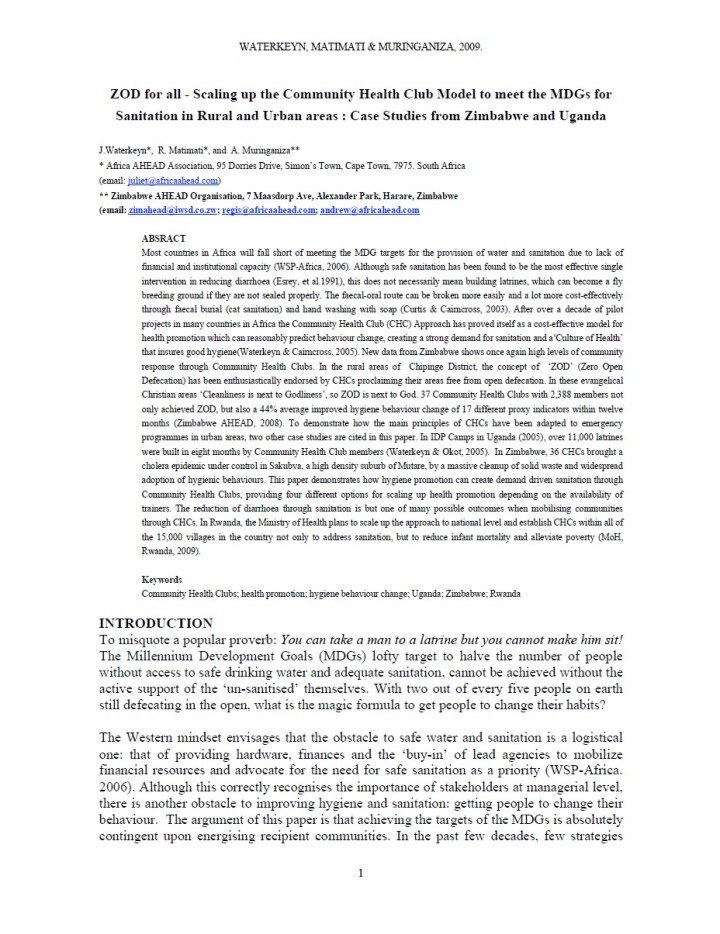ZOD for all - Scaling up the Community Health Club Model to Meet the MDGs for Sanitation in Rural and Urban Areas Case Studies from Zimbabwe and Uganda Waterkeyn, J., Matimati, R., Muringaniza, A. (2009)
Most countries in Africa will fall short of meeting the MDG targets for the provision of water and sanitation due to lack of financial and institutional capacity (WSP-Africa, 2006). Although safe sanitation has been found to be the most effective single intervention in reducing diarrhoea (Esrey, et al.1991), this does not necessarily mean building latrines, which can become a fly breeding ground if they are not sealed properly. The faecal-oral route can be broken more easily and a lot more cost-effectively through faecal burial (cat sanitation) and hand washing with soap (Curtis & Cairncross, 2003). After over a decade of pilot projects in many countries in Africa the Community Health Club (CHC) Approach has proved itself as a cost-effective model for health promotion which can reasonably predict behaviour change, creating a strong demand for sanitation and a‘Culture of Health’ that insures good hygiene(Waterkeyn & Cairncross, 2005). New data from Zimbabwe shows once again high levels of community
response through Community Health Clubs. In the rural areas of Chipinge District, the concept of ‘ZOD’ (Zero Open
Defecation) has been enthusiastically endorsed by CHCs proclaiming their areas free from open defecation. In these evangelical Christian areas ‘Cleanliness is next to Godliness’, so ZOD is next to God. 37 Community Health Clubs with 2,388 members not only achieved ZOD, but also a 44% average improved hygiene behaviour change of 17 different proxy indicators within twelve months (Zimbabwe AHEAD, 2008). To demonstrate how the main principles of CHCs have been adapted to emergency programmes in urban areas, two other case studies are cited in this paper. In IDP Camps in Uganda (2005), over 11,000 latrines were built in eight months by Community Health Club members (Waterkeyn & Okot, 2005). In Zimbabwe, 36 CHCs brought a cholera epidemic under control in Sakubva, a high density suburb of Mutare, by a massive cleanup of solid waste and widespread adoption of hygienic behaviours. This paper demonstrates how hygiene promotion can create demand driven sanitation through Community Health Clubs, providing four different options for scaling up health promotion depending on the availability of trainers. The reduction of diarrhoea through sanitation is but one of many possible outcomes when mobilising communities through CHCs. In Rwanda, the Ministry of Health plans to scale up the approach to national level and establish CHCs within all of the 15,000 villages in the country not only to address sanitation, but to reduce infant mortality and alleviate poverty (MoH, Rwanda, 2009)
Bibliographic information
Waterkeyn, J., Matimati, R., Muringaniza, A. (2009). ZOD for all - Scaling up the Community Health Club Model to Meet the MDGs for Sanitation in Rural and Urban Areas Case Studies from Zimbabwe and Uganda Africa AHEAD
Filter / Tags
Guidelines and manualsCase studies in other formatsEnglish
Downloads
ZOD for all - Scaling up the Community Health Club Model to Meet the MDGs for Sanitation in Rural and Urban Areas
Type: application/pdf
Size: 0.76 MB

